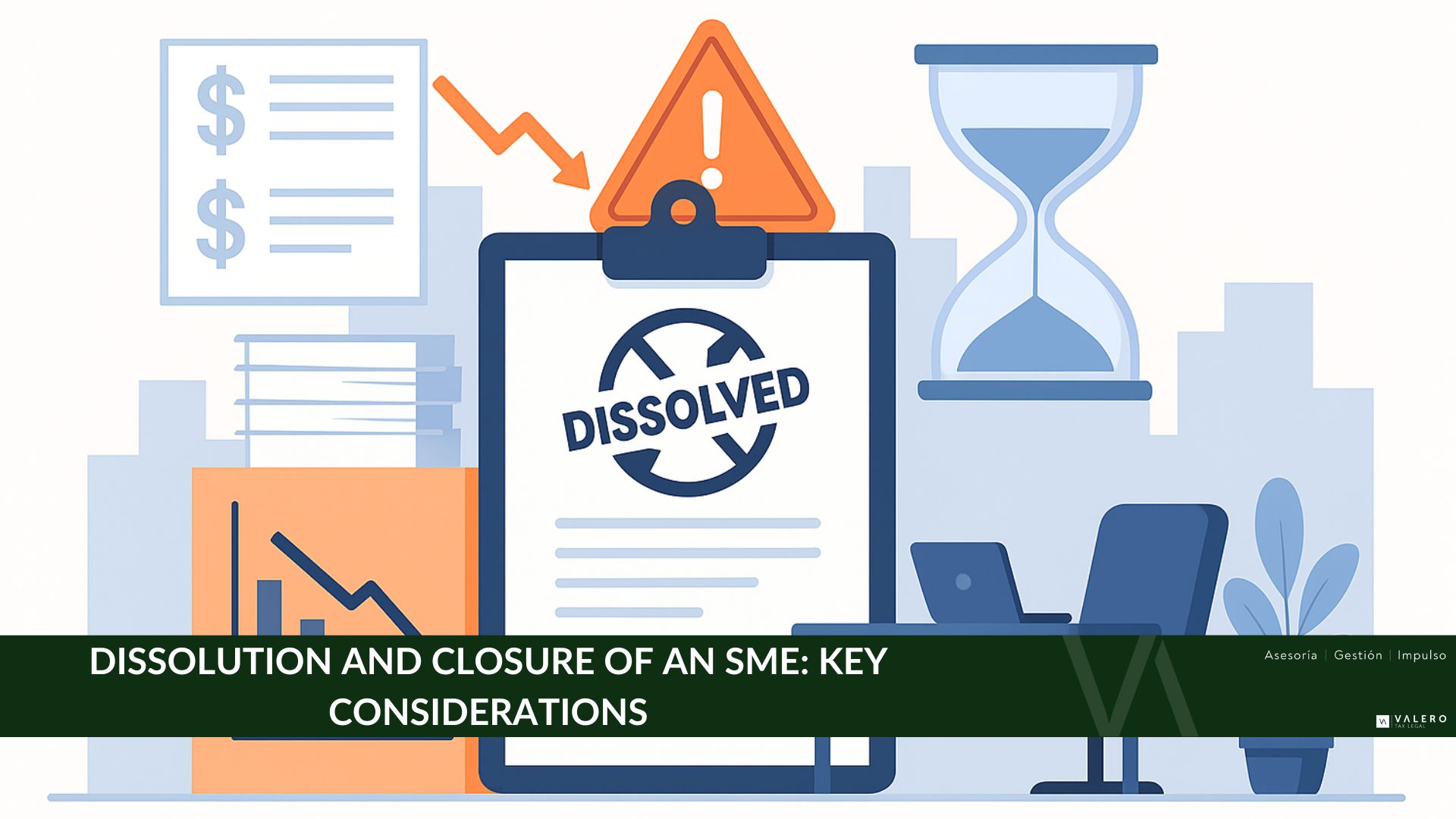Dissolution and closure of an SME: key considerations
Closing an SME is far more complex than just shutting its doors. It requires careful legal, accounting, and tax management, as well as a solid understanding of the responsibilities of directors and shareholders. In this post, we explain everything you need to consider to avoid sanctions and ensure an orderly and risk-free closure.

The process of dissolving and closing an SME is not just a business decision—it involves strict legal, tax, accounting, and financial obligations. At Valero Tax Legal, we walk you through the key issues you must address to avoid personal liability and ensure proper liquidation.
1. Directors' responsibilities
When a company enters a cause for dissolution, directors are required to call a general meeting within two months to adopt the dissolution agreement. If they fail to do so, or the meeting does not reach a resolution, they must request judicial dissolution or bankruptcy proceedings within the same two-month period.
Failure to comply may result in personal liability for directors for debts incurred after the cause for dissolution. Courts are increasingly strict, assuming directors should have been aware of the situation based on quarterly financial reports.
2. Accounting and formal obligations
Directors must draft the annual accounts within the first three months after the fiscal year ends. These must be approved by shareholders within six months, and then filed with the Commercial Registry in the following month.
If significant events occur between drafting and approval (e.g. liquidation, major losses, cost increases), directors are obligated to restate the accounts.
Failure to file the accounts can trigger penalties and registry closure, preventing registration of corporate actions such as capital increases or address changes, and damaging the company’s image.
3. Financial and debt considerations
Both sole proprietors and companies must notify the cessation of activity by filing form 036 or 037 with the tax authorities.
For outstanding debts, it's crucial to gather supporting documentation. If negotiation is possible, it is advisable to sign a notarized acknowledgment of debt or agree to new terms via promissory notes.
Before legal action, it's recommended to assess the debtor’s solvency, using commercial reports or property records. If the debtor company has already closed, recovery chances drop significantly.
It’s common for banks to require personal guarantees from partners in the early years, which can result in direct personal liability in case of non-payment.
4. Shareholders’ rights and duties
Shareholders may exercise their right to exit the company in certain cases, such as repeated non-distribution of dividends, provided legal conditions are met.
They should also review shareholder agreements, which may include clauses on retention, confidentiality, decision-making rights, anti-deadlock provisions, or penalties for breaches.
5. Free legal aid for micro-enterprises
Micro-enterprises involved in insolvency proceedings and lacking the means to pay legal costs are entitled to free legal assistance throughout the process.
At Valero Tax Legal, we recommend using professional tools such as the Memento Corporate Law Manual, a key resource for managing all stages of a company’s life cycle—from incorporation to dissolution.RELATED CONTENT
-
What are the most common reasons to redesign a website?
Having an updated, functional, and attractive website is no longer optional — it’s a necessity for any business that wants to stay competitive. If you’re wondering when the right time is to redesign your site, here you’ll find the most common signs that it’s time to take the leap.
-
Censos Web and the new 036 form: the digital revolution for entrepreneurs
The Spanish Tax Agency (AEAT) has launched "Censos Web", a new tool that significantly simplifies the registration process for business owners, professionals, and withholders. Thanks to this guided and digitalised system, registering as a self-employed worker or entrepreneur in Spain is now easier, faster, and safer.
-
Adverse COVID-19 Vaccine Reaction Recognised as Workplace Accident in Teacher’s Case
Adverse COVID-19 Vaccine Reaction Recognised as Workplace Accident in Teacher’s Case
